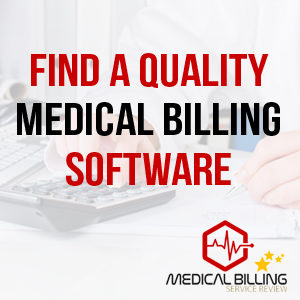
A Review of the Top 8 Medical Billing Services
In today’s fast-paced medical industry, efficient and accurate medical billing is crucial for a practice’s success. Outsourcing medical billing services can save time, reduce errors, and streamline the revenue cycle. In this blog, we will review the top 8 medical billing services, providing you with a comprehensive overview to help you choose the best service for your practice. Here are some of the top medical billing companies:
1. AdvancedMD
AdvancedMD is a popular medical billing service that offers comprehensive solutions for practices of all sizes. They provide a full suite of services, including claim submission, payment posting, denial management, and patient billing.
Key Features:
- Customized billing solutions
- Electronic claim submission
- Real-time claim tracking
2. Kareo
Kareo is a cloud-based medical billing service that focuses on providing user-friendly and efficient solutions for small to medium-sized practices. They offer an integrated platform that combines billing, scheduling, and electronic health records (EHR) services.
Key Features:
- Dedicated account manager
- Seamless integration with EHR systems
- Automated claim scrubbing

3. Athenahealth
Athenahealth is a leading provider of medical billing services, known for its innovative approach to healthcare technology. They offer a variety of services, including claim submission, denial management, and patient collections.
Key Features:
- Advanced analytics and reporting
- Customizable workflow options
- Dedicated customer support
4. eClinicalWorks
eClinicalWorks is a comprehensive medical billing service provider that offers a range of solutions for practices of all sizes. They provide a fully integrated EHR and practice management system, ensuring a seamless experience for users.
Key Features:
- Integrated EHR and practice management system
- Automated insurance eligibility verification
- Comprehensive denial management
5. DrChrono
DrChrono is a cloud-based medical billing service that provides an all-in-one solution for medical practices. They offer a fully integrated EHR, practice management, and billing platform, designed to streamline your practice’s operations.
Key Features:
- Customizable templates and forms
- Automated patient reminders
- Mobile app for on-the-go billing management
6. CareCloud
CareCloud is a medical billing service provider that offers an innovative, cloud-based platform for practice management, EHR, and billing services. They focus on providing flexible, customizable solutions to meet the unique needs of each practice.
Key Features:
- User-friendly interface
- Robust reporting and analytics
- Integrated patient portal
7. NextGen Healthcare
NextGen Healthcare is a well-established medical billing service provider, offering a range of solutions to help practices optimize their revenue cycle. They provide a fully integrated EHR and practice management system, along with advanced billing features.
Key Features:
- Real-time claim tracking
- Automated claim scrubbing
- Extensive reporting capabilities
8. Greenway Health
Greenway Health is a medical billing service that offers a comprehensive suite of solutions for practices of all sizes. They provide an integrated platform for EHR, practice management, and billing services, designed to streamline your practice’s operations.
Key Features:
- Customizable workflow options
- Advanced analytics and reporting
- Dedicated account management

Choosing the best medical billing services is essential for the success of your practice. The top 8 medical billing services reviewed in this blog offer a range of features, integrations, and support options, making it easier for you to find the perfect fit for your needs. By selecting a reliable and efficient medical billing service, you can streamline your practice’s revenue cycle, reduce errors, and ultimately improve patient care.
Understanding the Cost of Hiring a Medical Billing Service
When considering outsourcing your medical billing, it’s essential to understand the costs involved. The pricing of medical billing services can vary greatly depending on factors such as the size of your practice, the complexity of services, and the billing service provider. This section will provide an overview of the average costs of hiring a medical billing service, the average collection rate, and important factors to consider when making your decision.
Average Pricing Models
Medical billing services typically offer several pricing models, with the most common being a percentage-based model, a flat-fee model, or a hybrid model. Here’s an overview of these pricing models:
- Percentage-based model: The billing service charges a percentage of the total collections. This rate usually ranges between 4% and 10% of the collected revenue.
- Flat-fee model: The billing service charges a fixed fee per claim or per patient encounter. Flat fees can range from $3 to $10 per claim, depending on the provider and service complexity.
- Hybrid model: A combination of the percentage-based and flat-fee models, this approach involves charging a lower percentage of collections and a flat fee per claim.
Average Collection Rate
The average collection rate for medical billing services varies depending on the provider’s efficiency, expertise, and complexity of claims. Industry averages range between 95% and 99% of billed charges. A higher collection rate typically indicates better performance and effectiveness of the billing service.

Risks of Not Handling Medical Billing Professionally
While it may seem like a cost-saving move to handle medical billing in-house, there are a number of risks associated with not managing this important process professionally.
Risk 1: Compliance Issues
Medical billing involves complex codes and federal regulations, including HIPAA rules. Without a professional’s eye, it’s easy to miss compliance requirements. Inaccurate or fraudulent claims can lead to legal issues, penalties, and a tarnished reputation.
Risk 2: Revenue Loss
If claims are not submitted correctly, they can be denied or delayed by insurance companies. These mistakes can result in a significant loss of revenue for healthcare professionals. On the other hand, professional medical billing services can dramatically decrease the denial rate and increase revenue with their experience and expertise.
Risk 3: Inadequate Use of Medical Billing Software
Modern medical billing software can streamline billing processes, automate tasks, and reduce manual errors. However, if your in-house team isn’t proficient with the software, it can lead to costly mistakes. A professional medical billing service will have expert knowledge of EMR systems, ensuring efficient use of technology.
Risk 4: Lack of Focus on Patient Care
When healthcare professionals have to juggle administrative tasks and patient care, they may be spread too thin. This can compromise the quality of care provided to patients. Outsourcing to RCM services allows healthcare providers to focus on their core competency – patient care.
Risk 5: Not Adapting to Changing Needs
The healthcare industry is constantly evolving, and medical billing is no exception. Your practice’s specific needs might change over time, requiring a change in your billing process. In-house billing might not be able to adapt quickly, leading to potential issues. A professional billing service will be ahead of industry changes and can pivot to meet your evolving needs.
Professional medical billing services can provide specialized expertise, compliance assurance, and advanced technology to effectively manage the medical billing process. The risks of handling medical billing without professional assistance can outweigh the perceived cost savings. Therefore, it’s crucial for healthcare professionals to consider their options carefully and make informed decisions about their medical billing processes.
Factors to Consider When Choosing a Medical Billing Service
When evaluating the cost of hiring a medical billing service, it’s crucial to consider the following factors:
- Pricing model: Determine which pricing model best suits your practice’s needs and budget. Consider the potential impact on cash flow, especially if opting for a percentage-based model.
- Additional fees: Some billing services may charge additional fees for services such as claim submission, patient statements, and payment posting. Be sure to inquire about any extra costs before signing a contract.
- Collection rate: A higher collection rate is essential for the financial health of your practice. Evaluate the billing service’s average collection rate and compare it with industry standards.
- Support and customer service: Efficient and responsive customer support is vital when outsourcing medical billing. Ensure that the billing service offers dedicated account managers and timely support for any issues that may arise.
- Integration with existing systems: Seamless integration with your practice’s EHR and practice management systems is crucial for efficient billing operations. Confirm that the billing service is compatible with your existing software.
By carefully evaluating the cost of hiring a medical billing service, you can make an informed decision that aligns with your practice’s needs and budget. A reliable and efficient billing service can help streamline your revenue cycle management, allowing you to focus on providing quality patient care.
Step-By-Step Guide to the Medical Billing Process When Hiring a Medical Billing Service
Outsourcing your medical billing process to a dedicated service can make administrative tasks less stressful and more efficient. This guide will explain the steps taken when a medical billing company takes over the process:
Step 1: Patient Registration
The first step in the medical billing process involves patient registration. The patient’s personal details, medical history, and insurance information are collected and recorded.
Step 2: Insurance Verification
Next, the medical billing company checks the insurance coverage of the patient. The insurance policy details, like coverage limits, exclusions, and the need for pre-authorizations, are verified.
Step 3: Medical Coding
The diagnoses and procedures carried out by the doctor are converted into universal medical codes. These codes are crucial for preparing medical claims.
Step 4: Charge Entry
Based on the codes assigned, the cost of the treatment or procedure is determined. The medical billing service ensures that the charges align with the current standards and insurance company policies.
Step 5: Claim Submission
The claim, containing all the patient’s details, medical codes, and charges, is submitted to the insurance company. Most billing companies use electronic means to expedite the process and reduce errors.
Step 6: Payment Posting
Once the insurance company processes the claim, they send a payment to the healthcare provider. The medical billing service records this payment in their system and updates the patient’s account accordingly.
Step 7: Follow-Up and Denial Management
If the claim is denied or partially paid by the insurance company, the medical billing company investigates the reason behind it. They correct any errors or gather any necessary additional information and resubmit the claim.
Step 8: Patient Billing
After insurance payments, any remaining balance is billed to the patient. This could include co-pays, deductibles, or any services not covered by insurance.
Step 9: Reporting
The medical billing company prepares detailed reports on the billing processes, including claim submission, denial rates, and revenue. These reports can provide valuable insights for the healthcare provider.

This step-by-step guide provides a general overview of how a medical billing service navigates the complex world of healthcare finance. By effectively handling administrative tasks, these services help streamline the process, minimize errors, and ensure prompt, accurate payments for healthcare providers.
How Medical Billing Services Handle Insurance Claims
In the healthcare industry, efficient handling of insurance claims is critical to ensuring a smooth operation. Medical billing services play a crucial role in this process, taking the burden off the healthcare providers and allowing them to focus more on patient care. Let’s delve into the specifics of how these services handle insurance claims.
Understanding Medical Billing and Insurance Claims
Medical billing is a complex process that involves various stages, including patient registration, confirmation of financial responsibility, coding of diagnoses and treatments, and billing itself. It is here that medical billing services come into play, utilizing their expertise in the healthcare industry and the intricacies of medical coding.
Initiating Claims
Medical billing solutions start the claim process by collecting all necessary information from patients. This includes personal data and details about their insurance company and policy. Once they’ve gathered all the necessary details, they check eligibility and verify benefits with the insurance company.
Medical Coding
The next step involves medical coding, which is the process of assigning standard codes to the diagnoses and procedures performed on the patient. This step is crucial, as the correct codes determine the reimbursement from the insurance company. Medical billing services ensure accuracy in this process to prevent denials or delays in payment.
Filing Claims
After the procedures have been coded, the claim is prepared and submitted to the insurance company. This process is often done electronically, which is faster and reduces the likelihood of errors. The claim includes all necessary information, such as patient data, coded services, costs, and the healthcare provider’s details.
Follow-up and Payment
After submission, medical billing services monitor the claim status, following up with the insurance company as necessary. They handle any inquiries or disputes, ensuring that the claim is processed as quickly as possible. Once the insurance company approves the claim, payment is made to the healthcare provider. The medical billing service then posts the payment and balances the patient’s account.
Addressing Denials
In the event of a claim denial, medical billing services take swift action. They review the claim, identify the reasons for denial, and make necessary corrections or gather additional information. The corrected claim is then resubmitted to the insurance company.

In summary, medical billing services streamline the process of handling insurance claims, increasing efficiency and reducing stress for healthcare providers. Their knowledge of the healthcare industry and expertise in medical coding makes them an invaluable asset in ensuring successful claim submissions and reimbursements.
The Latest Technology in Medical Billing
Medical billing has undergone significant changes over the years, thanks to advancements in technology. Today, a variety of high-tech tools and systems are available to simplify the billing process, enhance accuracy, and ensure timely payments. Here’s a look at some of the latest technology for medical billers
Electronic Medical Records (EMR) System
An electronic medical record (EMR) system is a digital version of the traditional paper-based medical record for an individual. This technology allows healthcare professionals to track patient data over time and streamline the billing process.
- Streamlined Workflow: With an EMR system, healthcare providers can easily manage patient records, including their medical history, diagnoses, medications, treatment plans, immunization dates, and more. This reduces the possibility of errors and ensures accurate billing.
- Increased Efficiency: EMR systems eliminate the need for physical storage and make it easy to retrieve patient data. The ease of data access can save a significant amount of time for healthcare professionals and increase overall efficiency.
Robotic Process Automation (RPA)
Robotic Process Automation (RPA) is a software technology that automates repetitive tasks, like data entry and claims submission in the medical billing process.
- Efficiency and Accuracy: With RPA, medical billing companies can handle larger volumes of claims with higher accuracy. This technology helps reduce human error and improves the quality of services provided.
- Cost-Effective: RPA allows medical services to save on staffing costs, as fewer human resources are required to manage the billing processes.
Artificial Intelligence (AI) and Machine Learning (ML)
AI and ML are making waves in the healthcare industry. They offer the potential to revolutionize medical billing, particularly in the areas of fraud detection and coding.
- Fraud Detection: AI systems can analyze large volumes of claims to identify patterns and detect potential fraudulent activities. This helps protect both the healthcare providers and insurance companies.
- Improved Coding: ML algorithms can learn from previous instances and suggest the most accurate medical codes for services rendered. This can reduce errors in the coding process and improve the efficiency of billing.
To meet the specific needs of their patients and stay competitive, it is important for small practices and large healthcare facilities alike to stay updated with the latest technology in medical billing. It not only enhances the quality of services offered but also ensures that the medical billing process is as efficient and accurate as possible.

Adapting Best Practices in Medical Billing for Quality Services
In the rapidly evolving landscape of the healthcare industry, medical billing has become an increasingly complex process. Accuracy, speed, and compliance are paramount. To meet these demands, medical facilities need to adapt best practices in their billing operations. This not only maximizes efficiency but also ensures quality services for their patients.
Integrating Medical Software
One of the key best practices in today’s medical billing process involves the integration of advanced medical software. These tools offer a multitude of benefits, from streamlining administrative tasks to reducing billing errors. Advanced medical software is designed to automate the process, allowing for faster submission of claims and timely payments. With automatic error detection, these systems can help medical staff pinpoint potential discrepancies before submitting the claim, thus decreasing the chances of claim denials and delays.
Continuous Training for Medical Staff
Medical billing involves a complex set of tasks that require specific knowledge and skills. Thus, investing in continuous training for the medical staff handling billing is another best practice. This includes understanding the latest changes in billing codes, compliance requirements, and payer policies. Well-trained staff can identify and address billing issues promptly, ensuring the provision of quality services to patients and improved revenue for the healthcare facility.
Prioritizing Patient Communication
Effective patient communication is a critical component of quality medical billing services. Clear and transparent communication about billing processes and patient financial responsibilities can greatly reduce misunderstandings and disputes. This involves providing detailed billing statements, promptly addressing patient queries about their bills, and offering flexible payment options.
Regular Auditing
Regular auditing of the medical billing process is another best practice that cannot be ignored. Regular audits can identify areas of weakness or inefficiency in the billing process and offer insights on how to improve. It can also ensure that the billing process remains compliant with the constantly changing laws and regulations in the healthcare industry.
In conclusion, by incorporating these best practices into their operations, healthcare facilities can ensure they offer quality services to their patients while optimizing their revenue cycle. It’s about creating an efficient, compliant, and patient-friendly billing process that ultimately contributes to the overall success of the healthcare facility.
Author: Mike Cynar
Mike Cynar brings buyers and sellers together by producing reviews and creating non biased webpages allowing users to share their experiences on various products and services. He and his staff write informative articles related to the medical field, legal, and other small business industries.

Leave a Reply